Growing cooperation, especially among the youth, is building bridges for greater communication, Wang Ru reports.
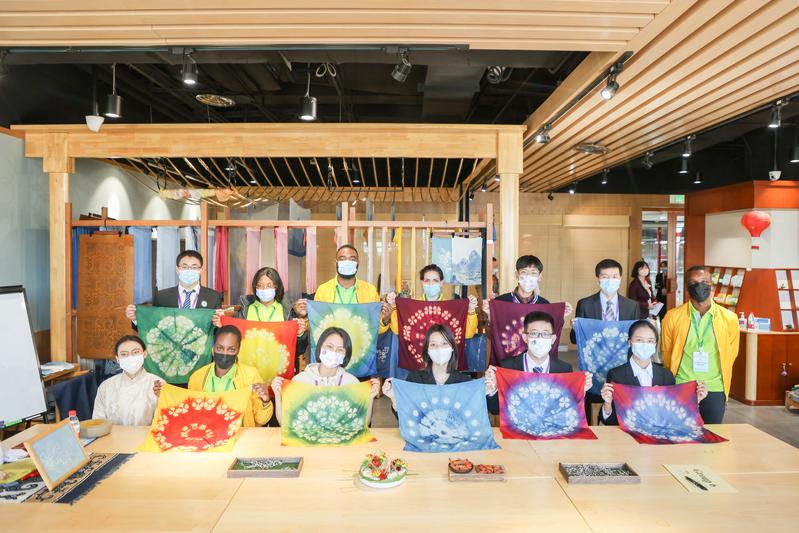 Chinese and African young people experience activities related to traditional Chinese culture, such as dyeing cloth during the 6th China-Africa Youth Festival, held last month in Beijing. (PHOTO PROVIDED TO CHINA DAILY)
Chinese and African young people experience activities related to traditional Chinese culture, such as dyeing cloth during the 6th China-Africa Youth Festival, held last month in Beijing. (PHOTO PROVIDED TO CHINA DAILY)
When Zhang Heyi, an Amharic (official language of Ethiopia) major at Beijing Foreign Studies University, was invited to participate in events to mark Africa Day in May, she sang and danced with her African counterparts on campus. Although she didn't know about their musical instruments or songs, she just couldn't help dancing with them and enjoying the celebration.
"African people can be attracted by hanfu, or traditional Chinese garments, and Chinese people can also be attracted by African dance," said Zhang, one of the Chinese youth representatives who was invited to attend a forum as part of the 6th China-Africa Youth Festival. "Culture can intensely touch people, and strike a chord among different countries. It helps build intimacy, develop trust and works as a bridge for communication."
Organized by the Ministry of Foreign Affairs and the China Soong Ching Ling Foundation, the festival, as a platform for communication between Chinese and African youths, was held in Beijing from Oct 19 to 22.The festival includes various activities like visiting exhibitions, attending forums, watching films and taking part in a series of events to experience traditional Chinese culture. Forty-five young people from 44 African countries, as well as Chinese youth representatives, took part in the activities.
"As the participants and contributors of China-Africa cooperation, young people are also the beneficiaries, inheritors and driving force of China-Africa relations," Baba Ahmad Jidda, Nigeria's ambassador to China, said in a video broadcast at the opening ceremony of the festival. "The young people today are more optimistic than ever before.
"Involving them at the forefront as active participants, with more than a decorative role, and not just on the fringes of dialogue can lead to development and progress when they see how impactful their actions and opinions are," he adds.
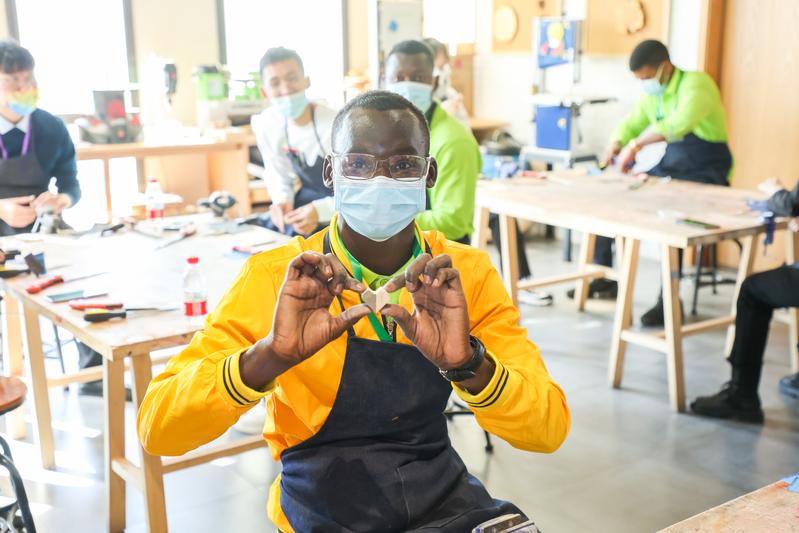 Chinese and African young people experience activities related to traditional Chinese culture, such as wood art during the 6th China-Africa Youth Festival, held last month in Beijing. (PHOTO PROVIDED TO CHINA DAILY)
Chinese and African young people experience activities related to traditional Chinese culture, such as wood art during the 6th China-Africa Youth Festival, held last month in Beijing. (PHOTO PROVIDED TO CHINA DAILY)
According to participating guest Li Hongfeng, dean of the School of African Studies of Beijing Foreign Studies University, China and Africa have a common awareness of the value of young people, and they both issue policies to promote their development. "In the global tide of the 21st century, with the joint efforts of governments and people across the world, young people now have a broader stage for their performances," he says.
As a university teacher, he finds young Chinese people have intense interest in African countries. "I started to open a selective course at BFSU last year about African culture and identity, and students rushed to select it. Some complained that the course was too popular and they could not get in," says Li.
"On the other hand, many of my students are working in African countries. They often share their opinions on African development and cooperation between China and Africa, and their love for Africa with me through WeChat (a popular social networking app in China)."
Chinese and African people often learn from each other. According to another participating guest Liang Anping, an official of the International Department of the Central Committee of the Communist Party of China, he learns from close relationships African officials have with people.
"When I worked in Africa, I saw officials of some African countries divide their work in a detailed way, sometimes visiting local people's houses, and laboring with them so that people developed close relationships with them. We can learn from their experience," says Liang.
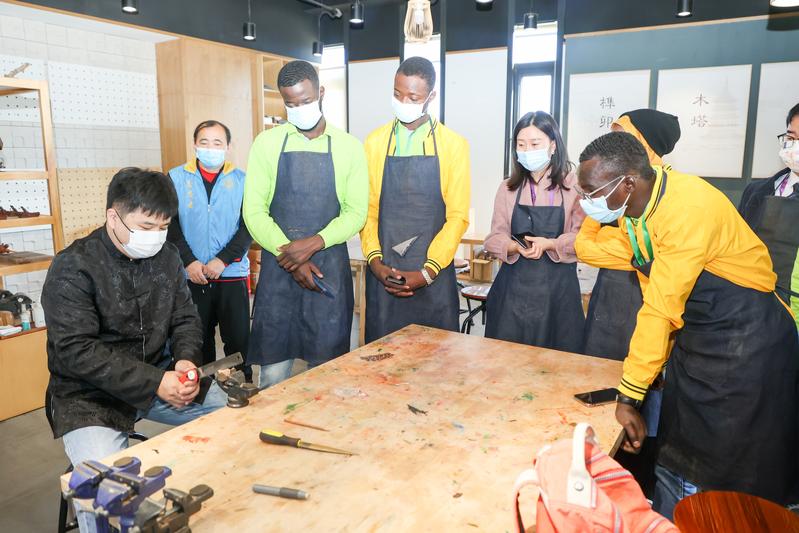 Chinese and African young people experience activities related to traditional Chinese culture, such as wood art during the 6th China-Africa Youth Festival, held last month in Beijing. (PHOTO PROVIDED TO CHINA DAILY)
Chinese and African young people experience activities related to traditional Chinese culture, such as wood art during the 6th China-Africa Youth Festival, held last month in Beijing. (PHOTO PROVIDED TO CHINA DAILY)
Maria Tukargbo, another youth representative, also an actress and singer from Sierra Leone, says she is moved by the story of Soong Ching Ling, widow of Sun Yat-sen and the late vice-chairwoman of China who had a universal love for young people.
According to Tukargbo, Soong's selfless and humanitarian spirit is a common legacy for people in China and elsewhere. "Anyone who wants to enact can learn a lot from Soong's spirit. There are so many poor people in Africa, and Soong's spirit can also touch and motivate them," she says.
Zhang highlights what the cultures share.
"China and Africa are both home to ancient, distinctive cultures, formed due to different historical paths, geography and other conditions. They share an emphasis on family, collectivism and coexistence between humanity and nature, although Chinese people are generally more reserved than their seemingly more ebullient African counterparts.
"Late Premier Zhou Enlai proposed to seek common ground while reserving differences during the Bandung Conference in 1955, and that is the point on how to find cultural commonalities and build bonds between us," she adds.
Current areas of cooperation between Beijing and Africa cover many sectors, like trade, technology, medicine and culture. For example, since 1968, Beijing started to send medical teams to Guinea. For the past half century, batches of medical workers have been dispatched in succession to help cure diseases in Africa.
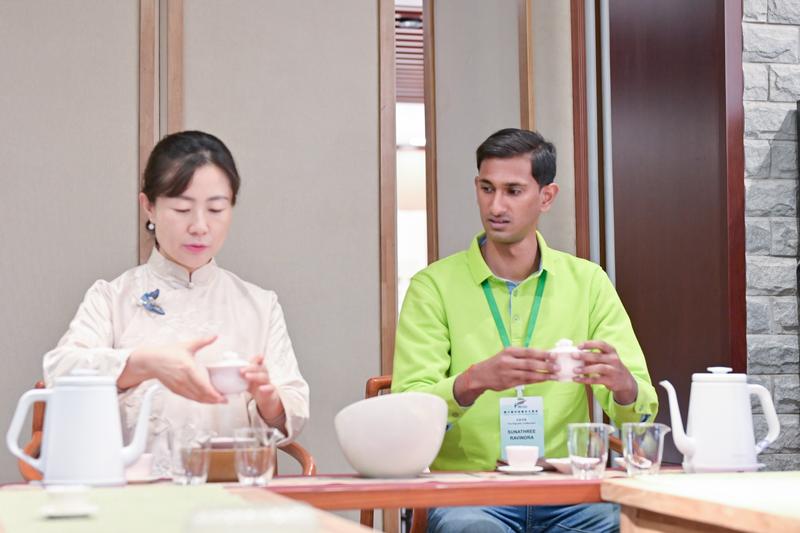 Chinese and African young people experience activities related to traditional Chinese culture, such as a tea ceremony during the 6th China-Africa Youth Festival, held last month in Beijing. (PHOTO PROVIDED TO CHINA DAILY)
Chinese and African young people experience activities related to traditional Chinese culture, such as a tea ceremony during the 6th China-Africa Youth Festival, held last month in Beijing. (PHOTO PROVIDED TO CHINA DAILY)
According to participating guest Xu Yujia, an official at the Foreign Affairs Office of Beijing, "from 2017 to 2020, Beijing's investment in Africa has exceeded $8 trillion. Beijing's enterprises have extensive cooperation with Africa in infrastructure, automobile manufacturing and big data".
Speaking about suggestions for further cooperation and communication, Xu says promoting the spread of cultural products is a good idea. "Both China and Africa have quality and popular cultural products, like TV series, documentaries, music and dance. If we can share our products, we will understand the other side more, reduce prejudices, and consolidate our friendship."
Another youth representative, Ding Ruilin, a student from BFSU, supports Xu's idea, and says music and short videos are the cultural products that they can pay special attention to.
"Music is an important part of both cultures. Modern pop music has a wide audience and can spread quickly, so with the theme of China-Africa cooperation, we can create songs that enable more people to learn the meaning of our cooperation," Ding says.
"Short videos, especially vlogs are quite popular. We can cooperate, making some videos showing the content of our cooperation and explaining cultural phenomena to each other," he adds.
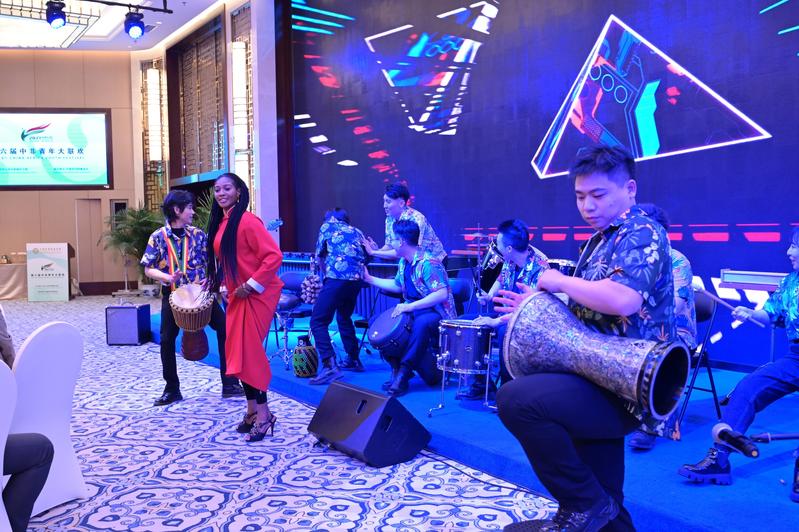 Chinese and African young people experience activities related to traditional Chinese culture, such as singing and dancing during the 6th China-Africa Youth Festival, held last month in Beijing. (PHOTO PROVIDED TO CHINA DAILY)
Chinese and African young people experience activities related to traditional Chinese culture, such as singing and dancing during the 6th China-Africa Youth Festival, held last month in Beijing. (PHOTO PROVIDED TO CHINA DAILY)
He also advises the need for regular online discussions on various topics, and Chinese and African young people to speak on international social networking platforms, clarifying misunderstandings about the cooperation between China and Africa.
"Some Western media discredit our cooperation and try to drive public opinion, which may mislead many young people. We need to safeguard the reputation of our cooperation, show the reality and spread knowledge about the real Africa and China to those around us," he adds.
Representative Joseph Olivier Mendoo, a Cameroonian student who studies at Peking University, says he hopes the festival can generate a mechanism for the cooperation between China and Africa. His idea was echoed by Wang Ke, former Chinese ambassador to Tanzania.
"The subsequent action or the mechanism is very important," Wang says. "It should be sustainable, which helps to extend the friendship between us, and also spread the spirit of cooperation that we stress through this festival."
Starting in 2016, the festival has been held for six consecutive years. This year's festival "paves the way for the Forum on China-Africa Cooperation that will be held in Senegal in November", according to Wang.
Contact the writer at wangru1@chinadaily.com.cn


